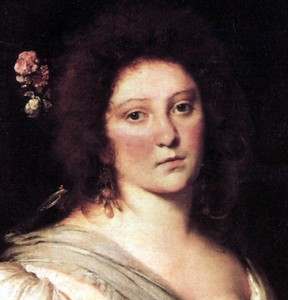Barbara Strozzi – Virtuosissima Cantatrice
One of the composers that will be featured on Magnificat’s program for the weekend of February 4-6 2011 is Barbara Strozzi. The following biographical essay is posted at Dr. Candace Magner’s excellent website devoted to Barbara Strozzi. We have cross-posted here with permission of the author.
Barbara Strozzi had the good fortune to be born into a world of creativity, intellectual ferment, and artistic freedom. She made a mark as composer and singer, eventually publishing eight collections of songs – more music in print during her lifetime than even the most famous composers of her day – without the support of the Church or the patronage of a noble house. She is sometimes credited with the genesis of an entire musical genre, the cantata. Her works were included in important collections of song which found their way to the rest of Europe and England. Yet she died in obscurity in Padua in 1677 with little wealth or property.
Born in 1619 in Venice, Barbara was baptized on August 6 at the Santa Sofia parish. At that time, Venice was at its cultural peak, a city of wealth, peace, academic curiosity, and musical innovation. In addition to the luck of time and place, Barbara grew up in a household frequented by the greatest literary and musical minds of the age. The adopted daughter of poet Giulio Strozzi was most likely his natural daughter, recognized or ‘legitimized’ in his will of 1628 as his figliuola elettiva. Her mother Isabella lived in the same household as Giulio and was his principle heir until Barbara should come of age.
Though born in Venice, Giulio, himself the illegitimate and later recognized son of Roberto Strozzi, was nonetheless a member of one of the most powerful families of Florence, second only to the Medici in wealth and influence. That the Strozzi name was recognized far and wide may have assisted Giulio in his ability to mix with many levels of Italian society. He was the founder of several accademie or groups of creative intellectuals, and was an influential member of the Accademia degli Incogniti formed by the writer Giovanni Francesco Loredano in Venice. This group was almost single-handedly responsible for the ‘invention’ and spread of what was to become known as Opera – music and theatre highly intertwined into a new art form which flourished in Venice throughout the 17th century and then expanded throughout the continent. The Incogniti counted among its participants famous authors, poets, philosophers, and musicians, possibly including the great Monteverdi. It was into this milieu that young Barbara was introduced as a singer and composer.
